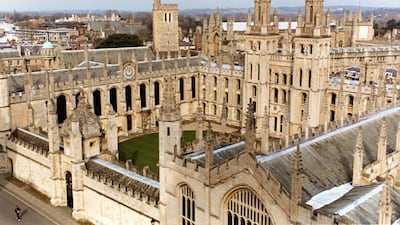Pupils from UK private schools face double the barrier for entry to Oxford and Cambridge and other top universities, an investigation has revealed.
Figures show half the number of pupils from British state schools need to attain the same high grades as private school pupils to get into some Russell Group institutions, traditionally considered to be the cream of the British university crop.
The data was revealed in response to a Freedom of Information request from the Telegraph newspaper with the University of Bristol one of the elite establishments shown to be taking a two-tiered approach.
It set entry grades at three As or above for 76 per cent of private school pupils who received a conditional offer to start last year, a percentage which dropped to 40 per cent for their state equivalents.
The disjunction intensifies for the most competitive subjects, such as maths, history and English.
Nearly all private school pupils applying to study history at Bristol were told they must achieve A grades or higher but just 50 per cent of state-school pupils had to reach this level.
The data shows the disparity has developed over time, with King's College London and the University of Exeter two other Russell Group institutions to apply the markedly divergent approach.
Higher Education Statistics Agency figures for 2020-21 show 73 per cent of Bristol undergraduates were state-school educated, with the percentages at 65.5 per cent and 83 per cent for Exeter and King’s College London respectively.
Contextual offers: social engineering or social fairness?
As well inserting an extra strand to the debate on whether UK private schools are worth it in the face of rocketing fees, it also resurrects the debate around the fairness of positive discrimination for state-school pupils.
“Universities are not supposed to be about social engineering,” Barnaby Lenon, chairman of the Independent Schools Council and a former headmaster of Harrow School, told the Telegraph.
“School type should never be the basis for university admission decisions. It is perfectly reasonable to make lower offers to applicants who are known to have greater potential than their A-level grades might suggest, but that would be as true of independent school pupils as state. Contextual admissions is only a fair system if applied fairly — which means looking at the individual pupil and their circumstances, not the type of school they go to.”
This thesis is tested by a Sutton Trust study published earlier this month into the debilitating effects of the coronavirus pandemic on UK pupils.

Eighty per cent of students expected to take A Levels in England this school year said their academic progress had suffered.
Crucially, almost half (46 per cent) of state school pupils said they had not been able to catch up with learning, a significantly higher proportion than those at independent schools (27 per cent).
The contextual approach taking by the Russell Group institutions to entrance appears to reflect this imbalance.
“We use contextual offers as we recognise that a student's potential may not always be reflected in their predicted grades, especially if they have been affected by educational or domestic disadvantage,” a University of Bristol representative told the Telegraph.
Similarly, Exeter said it was “proud” of its contextual admissions policy, which is part of its “unwavering commitment to welcoming students from all backgrounds to the Exeter academic and research community.”









